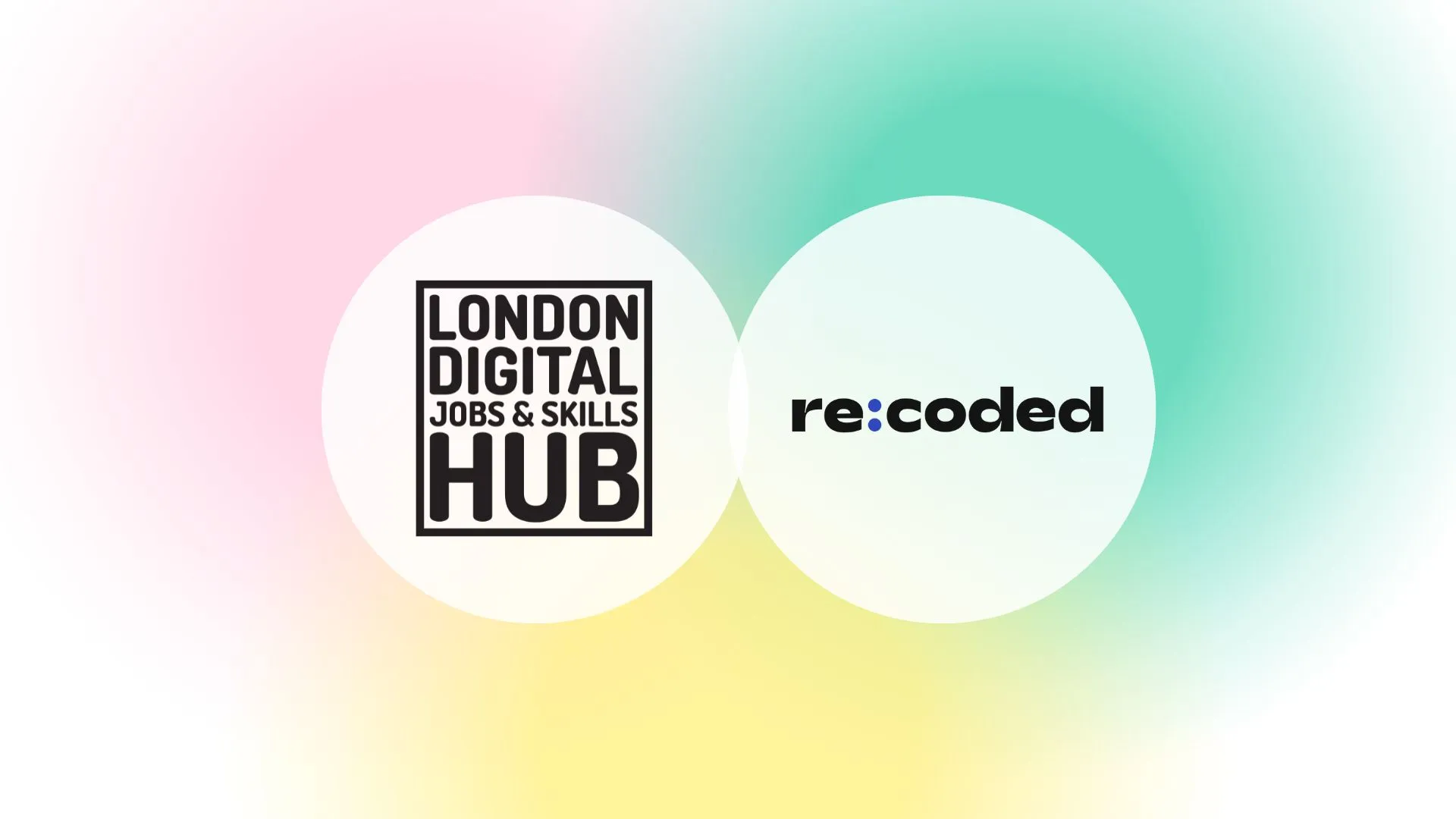Top things we're looking for in your bootcamp application
Out of several hundred applications for a bootcamp only 20 students get accepted in the end. We sat down with our Senior Program Manager Jaime Mikush to know more about what she is looking for in a candidate.

7
min read //
September 8, 2021

Table of content

Subscribe to our newsletter
It looks so easy with the big blue ‘Apply Now’ button on the website, but once you click you are met with high expectations and a rigorous selection process over 6 weeks. And you’re competing with 400-500 applicants all eager for a chance to start a career as web developers.
With every bootcamp there is a team of 3-5 people at Re:Coded looking to find the right candidates for each bootcamp. People who are really motivated, excited to learn and ready to commit the time and effort it takes to go through a bootcamp. The intensity of the application process is intended to reflect the intensity of the bootcamp itself, so naturally not all go through all stages.
Applying is just the first step, and there is still a long way to go before you get accepted.
Jaime Mikush is our Senior Program Manager for Türkiye and she is leading the team that evaluates all the applications coming in for our upcoming bootcamp in Istanbul. We asked her what she is really looking for in a candidate.
What is the first thing you’re looking for?
At first, I don’t look at age, experience or where people come from. I always look for why they want to become web developers. What do they want to achieve or build? If you have an idea of what you want to do with the skills you’ll learn that’s always a good indicator of how motivated people are.
Motivation is the key component in evaluating the process so spend some time on your application. Do your research, make sure you have read all the requirements, that you understand what Re:Coded is, what you will learn and especially make sure to think about why you want to do this.
This is really a once in a lifetime opportunity. It would be for anyone anywhere in the world - also in America where I’m from. You get the chance to learn how to code by going through the curriculum of the Flatiron School in New York, which is one of the leading coding schools in the world. That would normally cost around $17.000 to participate in a similar course with them, but as a non-profit we have a partnership that ensures a full scholarship. That is really unique.
You get to go through the training with the help of our amazing trainer team, so you should really make the best of it. This is really a chance to kick off a new career for yourself.
I always wonder when I see people writing only a few words for each question. Why even bother, then? Don’t just say you want to improve your skills – tell us why and what you want to do with it.
Is coding experience a requirement?
I remember reading an application from the Gaziantep Bootcamp from someone who didn’t have any experience at all with coding. But he had a clear idea of what he wanted to do with it.
He wanted to make a map of all the barber shops in Gaziantep and I just thought that was such a good idea. He knew what he wanted to do and how the bootcamp would help him achieve that. And I love when people upload sketches – even if it’s just a drawing of something they would like to do.
So no, you don’t have to have had any coding experience for the most of our bootcamps.
(Some coding experience will be considered an asset for the Backend and React Bootcamp - check 'Selection Criteria').
This bootcamp is designed for people with no or little knowledge in coding and we have people with all kinds of backgrounds. But you will have learned how to code, when you finish the bootcamp.
What else are you looking for?
We are looking for team players. People who can work together and who like to work in teams. It’s a necessary skill in class and it’s a necessary skill for an employer.
We’re also looking for balance in who we accept. We’re working to bridge the gender divide in the world of tech, and we want to have at least 40% women in the class. There are so many amazing women who have gone through our programs.
We are also looking to have a mix of both local youths and Syrian refugees, and we aim to have 50% Syrians in the class as well. So, demographics play their part in the process.
How many get accepted to the bootcamp?
In terms of pure numbers, I can tell you a little about our last bootcamp in Istanbul where we had around 350 applications.
We read through every single one of them and 120 went to the second phase where they received a coding challenge.
From that group about half were selected for phase 3 which is a mindset assessment. Most of the applicants from that phase go on for the final interviews and in the end, we selected the 23 students and they are now almost about to finish their bootcamp.
Tell me a little about what happens in each phase
So, the first phase is the application. This is where we initially get to know them, their dreams, why they applied and where they are coming from in terms of motivation.
The second phase is a coding challenge. You don’t have to know coding in advance to solve the challenge. We provide online material with 12 hours of coding lessons and then you’ll have a full weekend to finish the challenge.
We’re not looking for perfection. We just want to see you make an effort to show that you are motivated and capable of learning how to code. The bootcamp itself is intense, and you will get tested in the 5 months it takes to complete. So, if you give up after a few lessons of intro to coding, chances are you’ll likely struggle to complete the bootcamp as well.
But again – it’s more about effort, so work on it and submit what you have instead of giving up. No answer is worse than a wrong answer.
The third phase is a logic and mindset assessment. For this one we test whether you will be a good fit for the bootcamp. We are looking for how you work with others and whether you would be good in a team. We’re also looking for how motivated you are. How excited you are to learn new skills.
And finally, it’s about problem solving. How do you approach a problem? It’s not a difficult test, but it does tell us something about you, and those who scored high in the mindset assessment often do really well in the course.
In the fourth phase we have the final interviews. This is the first time we meet face to face, so this is where we get to see if the expectations we have in a candidate based on their performance in the previous phases, match the person sitting in front of us. We’ve had applicants who, it turned out, had someone to help with each phase of the application process, so at the interview all our excitement about her fell flat, when it quickly became clear she had hardly done anything herself. Those things will come out in an interview.
But most often, I get to meet some really great people who often exceed expectations and it is a joy to be in those interviews hearing their stories and motivations.
What do you talk about in the final interviews?
We talk about how they work in teams, how they handle stress, and what they want to do with web development. There is no perfect answer to that last question and people have different reasons for why they want to become a web developer. Some have liked computers from an early age and others got inspired later on in life to solve a specific problem.
When we do in-person interviews, we also do a technical interview to test their skills and to see how they handle stress. Some give up fast and others keep trying and often they are the ones who will succeed in the bootcamp.
What are some of the typical challenges to succeed in the bootcamp? I’ll be honest and say it is a pretty intense experience going through the bootcamp. It takes a lot of commitment, so you really have to decide with yourself whether you are ready to do it. It makes me so sad when someone leaves, but not everyone makes it through each time.
First of all, you have to be good at time management. We will help you with this, but if you plan to both study and work on the side while doing this bootcamp, you’ll probably fail.
Most of our bootcamp students either work or study on the side, so it’s possible but it requires some good time management. We expect you to spend 20-25 hours per week on self-study and we expect you to attend about 10-14 hours of classes. That’s hard, but most people learn how to handle it.
Language is another barrier for some. Everything from curriculum to classes to the conversations in and around the classroom experience will be in English. So, it is really important that you speak and understand enough English or else you will struggle.
Any final advice?
Well, I will just say that this is your chance to enter the digital economy as a web developer and it will open so many doors for you. There is such a demand for web developers, and you’ll have a chance to work remotely for global clients as well.
It is truly a career that is suited for the world of today and tomorrow, so make the best of it. We will help you on the way, but it is really on you to make the most of it and it all depends on the effort you put in. But when I see where our students are today, I know it’s worth it.
Jaime Mikush is Senior Program Manager for Türkiye at Re:Coded

.webp)


.svg)
.svg)



.png)
.svg)
